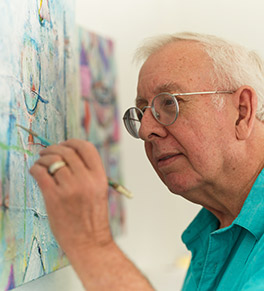Surgery cures an artist's seizures

Artist Alan Powell enjoyed a fulfilling creative life, little bothered by strange bodily sensations he’d sometimes experience.
But after he moved to the Joshua Tree area, those sensations intensified, leading to long hospitalizations and leaving him unable to pursue his passions: painting and music.
Diagnosed with a treatment-resistant seizure disorder, he was referred to the UCI Health Comprehensive Epilepsy Center, Orange County’s only academic epilepsy program and one of the leading epilepsy centers in Southern California.
Powell soon realized that his medical team was determined not only to stop his convulsions, but also to restore his creativity and quality of life — outcomes he’d thought were unattainable.
'We don't give up'
“I was struck by how much the doctors cared about my art,” says Powell, now 67.
“Their goal was always to have me come out in as good a shape as possible to continue to paint and make music. I could tell that this came straight from their hearts. They were truly concerned about me and what I could do with my life.”
That ethos is baked into the UCI Health epilepsy team.
“Working together, we really can change lives," says Dr. Mona Sazgar, a nationally regarded neurologist and epileptologist.
"We can help people get back to work, to driving, to their lives and families. That’s the most satisfying thing about our jobs.”
The team tailors its approach for each patient, offering a wide spectrum of treatments that can help eliminate or significantly reduce seizures for many people.
“We work with the most difficult-to-treat patients, ones that a lot of other programs have given up on,” says Powell’s neurosurgeon, Dr. Sumeet Vadera.
“We don’t give up.”
An artist emerges
Powell spent his childhood in the Missouri town of Creve Coeur — or “broken heart,” as his mother would sometimes say. Later he attended UC Berkeley on a scholarship to study physics in the 1970s.
“I was asked to leave almost as quickly as I got there,” he admits, saying he partied instead of attending class.
An accomplished musician whose guitars were always within reach, he was soon playing gigs with well-known groups in San Francisco and Los Angeles.
Ultimately, he chose his true love: painting. He began studies at the University of Tennessee’s School of Art in Knoxville under several art world luminaries, including renowned conceptual artist and ecofeminist Pam Longobardi. After graduating, Powell made his way back to California, settling in Orange County and establishing a career as a graphic designer and painter.
Yet something else was always lurking in the background. Since childhood, he’d sometimes have what he described as out-of-body experiences.
Epilepsy diagnosis
It wasn’t until 2013, when he began having the episodes more frequently — even suffering a serious fall during one — that doctors diagnosed Powell with epilepsy and prescribed dilantin, a common anti-seizure medication. The drug didn’t halt the seizures, however. His convulsions increased in frequency and severity over the next few years despite prescriptions for ever stronger medications.
Vadera says about a third of people with epilepsy don’t respond sufficiently to medication. More concerning, repeated seizures irritate the brain. Combined with the effects of heavy medications, seizure disorders can take a toll on patients.
Eventually, Powell couldn’t manage the complicated, ever-evolving computer programs he used in graphic design and digital video production. Nor could he paint or play music. His seizures routinely landed him in emergency rooms and even intensive care for prolonged grand mal attacks, the most dangerous type.
In 2016, Powell and his wife, Nancy DeVore, moved from Fullerton to the Joshua Tree area, where the landscape had always resonated with him. “Life with chronic seizures just looked bleak and scary though,” recalls DeVore, who found her husband several times amid full-blown seizure episodes.
After one seizure landed Powell in nearby Hi-Desert Medical Center, he had to be airlifted to a Palm Springs-area hospital. A neurologist there convinced him to consult with Sazgar at UCI Health.
Pinpointing the seizures' origin
One of the most respected epilepsy centers in California, the UCI Health team performs a significant number of surgical procedures each year to ameliorate seizures. Home to a state-of-the-art monitoring unit, the center’s doctors conduct tests to identify which parts of the brain are generating the electrical storms that cause seizures.
A battery of assessments — including an MRI scan, an electroencephalogram (EEG) and a positron emission tomography (PET) scan — showed that Powell’s seizures were occurring in a part of his temporal lobe, a section of the brain about the size of a baby’s fist that sits behind the eyes and extends to the ears.
After evaluating him, Sazgar and Vadera concluded that Powell was a good candidate for surgery, but they recommended an ultraconservative approach to preserve his function.
Vadera performed a minimally invasive laser procedure guided with magnetic resonance imaging (MRI). The goal was to abrade, or scrape, the specific area in his brain where the seizures originated.
The procedure went well, but Powell continued to experience seizures, some worse than ever.
A second approach
The medical team proposed another more complex procedure: removing his right temporal lobe, a part of the brain responsible for visual and spatial memory — both extremely important for artistic people like Powell.
Excising the damaged area would stop the seizures, they told him, adding that other parts of his brain could potentially compensate.
Powell and DeVore agreed to move forward, a decision Vadera understands is difficult.
“People have many misconceptions and fears about surgery, but especially brain surgery,” the neurosurgeon says. “I give a lot of credit to patients for having the courage to go forward.”
Reclaiming a life’s work
On Nov. 25, 2020, Vadera performed a right anterior lobectomy. Within weeks, Powell was functioning and thinking more clearly.
“Best of all, the seizures stopped,” he says.
Then the real miracle happened. After six years being unable to paint, the artist picked up his brushes again, feeling a surge of creativity that had been missing from his life for even longer.
“I’m painting prolifically right now,” he says, more than a year after the surgery. “The work I’ve done recently is by far the best of my lifetime. It’s good to be able to do what you love.”
An inveterate jokester, he now tells people that if they are “ever fortunate enough” to be as sick as he was, there’s only one place to go: UCI Health.
“When I first got diagnosed, I remember telling a doctor friend that I didn’t want epilepsy,” Powell recalls. “He told me, ‘Well, you can’t get rid of it.’ But guess what? With UCI Health, Nan and I learned that you can.”
Stop at nothing
That’s the message the epilepsy team wants to emphasize: They stop at nothing to help people with epilepsy.
"Our mission is to find ways to eliminate seizures — no matter your age or however long you’ve had them,” says Sazgar, a national expert in catamenial epilepsy, a seizure disorder associated with women’s hormonal changes that makes pregnancy and nursing difficult.
“Sometimes I’ll meet people who have suffered with seizures for decades,” she adds. “They can’t drive; they can’t work. It really takes such a toll on their lives and their families. I just wish everyone knew we are here."
Vadera and Sazgar continue to monitor Powell closely. He still takes some medication as a precaution but hopes to be completely free of the drugs in the near future. He hasn’t had a seizure in well over a year.
He has found renewed purpose and inspiration in his art, informed by his interests in science, math and spirituality. He says his paintings explore the idea that we may be spiritual beings having a human experience.
He's even playing guitar again.
“I’m as surprised as anyone to say it, but this is one of the most exciting times in my life,” Powell says. “It’s almost like I’m bumping into the real me for the first time.”







